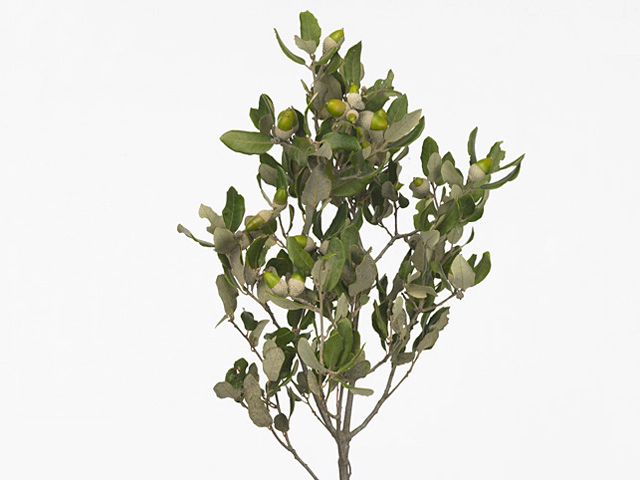Quercus ilex

| Leaf arrangement | spreaded |
| Life span | Long (over 200 years) |
| Fruit type | Nut(let) |
| Flower scent | Unscented |
| Leaf type | Foliage leaf |
| Winter hardness | Limited (USDA-zone 8) |
| Inflorescence | Spike; Catkin |
| Leaf division | Simple |
| Reproduction mode | Sexual |
| Maintenance after 2 yrs | No special demands |
| Flower sex (distribution) | Monoecious (flowers unisexual) |
| Application / Suitable for | Solitary plant; Park tree |
| Toxicity (if consumed) | Not or barely |
The Quercus ilex, commonly known as the Oak tree, is a majestic and long-lived tree that can survive for over 200 years. It belongs to the family of Fagaceae and is native to the Mediterranean region. Its unique characteristics and suitability for various applications make it a popular choice in parks and gardens.
One of the distinctive features of the Quercus ilex is its spreaded leaf arrangement, which provides an elegant and wide canopy. The foliage leaf type adds to its beauty, with simple leaf divisions that add a touch of sophistication. During the winter, however, the tree's resilience is tested as it has limited winter hardness, surviving only in USDA-zone 8 and above.
The Quercus ilex produces small nut-like fruits called "nutlets." These fruits, although not typically consumed by humans, are an essential food source for various animals and birds. The flowers of the Oak tree are unassuming, with no discernible scent. They are arranged in inflorescences that take the form of spikes or catkins.
When it comes to reproduction, the Quercus ilex follows a sexual mode of reproduction. The tree is monoecious, meaning it has separate male and female flowers on the same tree. This enables cross-pollination and contributes to the genetic diversity of the species.
In terms of maintenance, the Quercus ilex is relatively undemanding. After the initial two years, it requires no special care. This makes it an ideal choice for those seeking a low-maintenance tree for their gardens or parks. However, it is important to note that the tree has no tolerance for consumption and is not toxic to humans or animals.
The Quercus ilex's application is versatile and well-suited for various purposes. As a solitary plant, it can add grandeur to any landscape, commanding attention with its impressive presence. It is also commonly used as a park tree, providing shade and enhancing the overall ambiance of the space.
Overall, the Quercus ilex, with its long lifespan and unique characteristics, is a valuable addition to any garden or park. Its wide canopy, unassuming flowers, and low-maintenance requirements make it an excellent choice for those seeking a majestic and enduring tree.
Market availability index by month:
| Jan. | Feb. | Mar. | Apr. | May | Jun. | Jul. | Aug. | Sep. | Oct. | Nov. | Dec. |
|---|---|---|---|---|---|---|---|---|---|---|---|
| 1 | 1 | 1 | 1 | 1 | 1 | 1 | 2 | 3 | 4 | 1 | 1 |